What Temperature Should I Wash Sheets? A Guide to Proper Care
My friend called me in a panic last week after turning her favorite silk sheets into something that could fit a doll’s bed. “How was I supposed to know hot water would destroy them?” she wailed. As someone who’s worked in a home goods store for years, I’ve seen my share of laundry disasters. Just last month, a customer brought in photos of his Egyptian cotton sheets that had somehow morphed into a twisted, gray mess.
These sheet-washing mishaps are more common than you’d think, and they’re exactly why I’ve become that person who gets weirdly excited about proper laundry temperatures. Through countless loads of laundry and many rescue missions for friends’ bedding emergencies, I’ve learned that different fabrics need different temperature treatments. It’s like matchmaking, really—pair the wrong sheet with the wrong temperature, and you’ve got yourself a laundry room romance gone wrong.
Why Sheet Washing Temps Matter
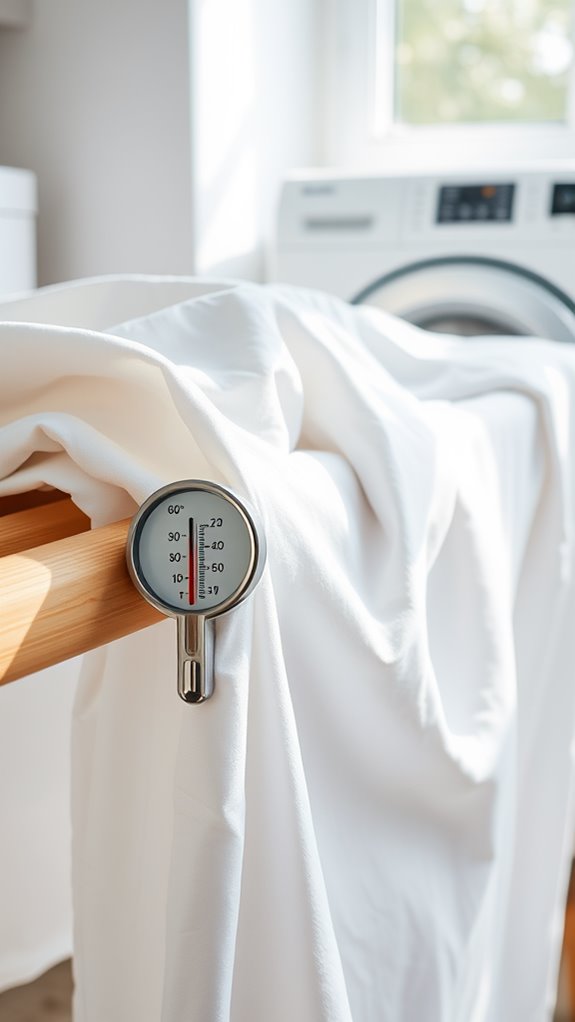
When it comes to washing sheets, the temperature really does matter—trust me, I’ve learned the hard way! Hot water zaps germs, but it can wear out your sheets faster than you’d like. Warm water strikes a balance, cleaning well without damage. And cold water? It’s energy-friendly, but mightn’t kick those pesky dust mites to the curb. Proper bedding care helps extend the life of linens and maintains their appearance while reducing exposure to germs and allergens. Choose wisely, my friend!
What Temperature Should I Wash Sheets?
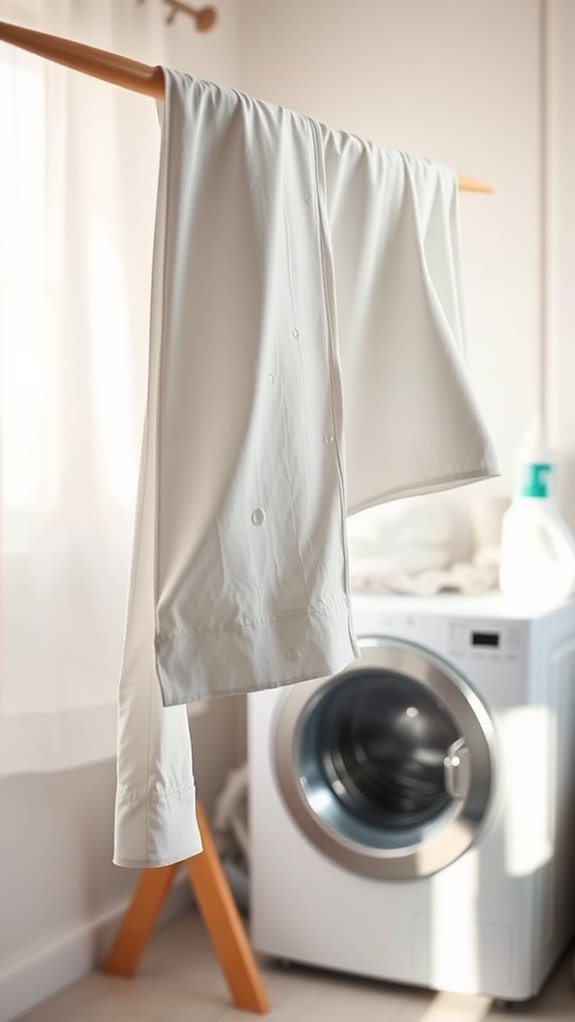
Choosing the right temperature for washing sheets can feel a bit like navigating a laundry minefield, but don’t worry—I’ve got your back!
Navigating laundry can be tricky, but with the right tips, washing sheets becomes a breeze!
For cotton, crank it up to hot—130°F or more.
Polyester blends love warm water, while linen prefers a cozy warm or cold soak.
And silk? Keep it cool at 86°F.
Your sheets will thank you for it!
How to Wash Sheets Like a Pro
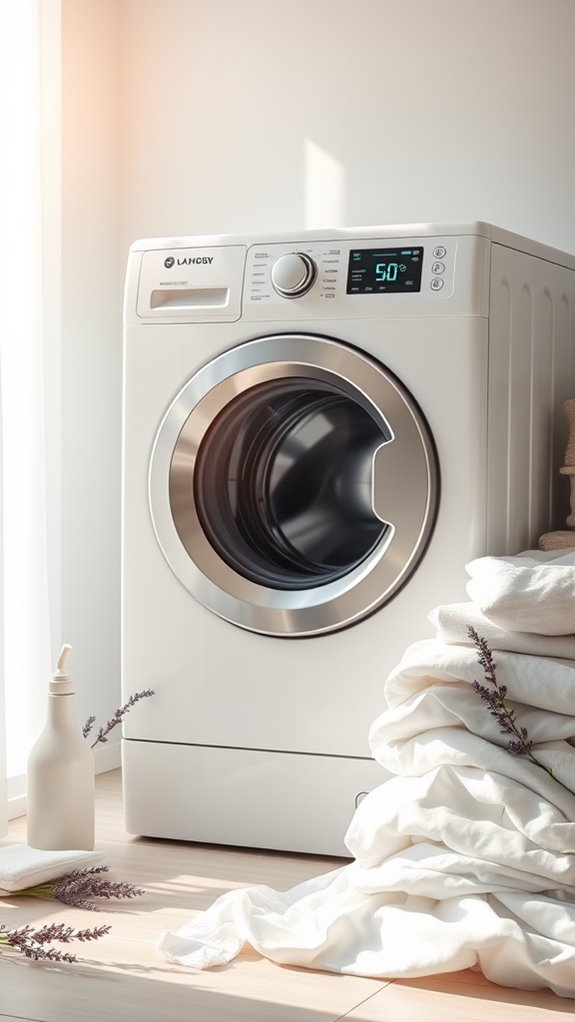
Alright, let’s get down to the nitty-gritty of washing sheets like a pro!
First off, always check that label—your sheets will thank you for it later.
And hey, when it comes to sanitizing, don’t shy away from hot water if your laundry can handle it; those pesky germs won’t stand a chance!
Remember, new sheets may harbor bacteria, germs, and allergens, making it crucial to wash them before use.
Check the Label First
Checking the care label on your sheets is like consulting a wise sage before embarking on an adventure—it’s the secret to avoiding laundry disasters!
Different fabrics have different needs, so I always check. Cotton loves hot water, while silk prefers a cool swim.
Ignoring the label? That’s like wearing flip-flops in a snowstorm—a total recipe for chaos!
Trust me, read before you wash!
Sanitize When Needed
While it might be tempting to toss your sheets in the wash and call it a day, sanitizing them properly can make all the difference for a healthier night’s sleep.
For most fabrics, crank that water up to 60°C (140°F) to send germs packing.
Just remember—delicate sheets deserve a cooler touch.
Your snooze deserves nothing less than clean, fresh linens!
Pick the Best Detergent
Ever wonder what makes the perfect detergent for your sheets? I swear by a chemical-free, disinfecting option that tackles allergens without the harsh stuff.
For cotton, about 1/4 cup of mild liquid does the trick. If you’re washing delicate silk, grab a special silk detergent.
And hey, a little color-safe bleach can brighten things up—just check those labels before diving in!
Drying Sheets the Right Way
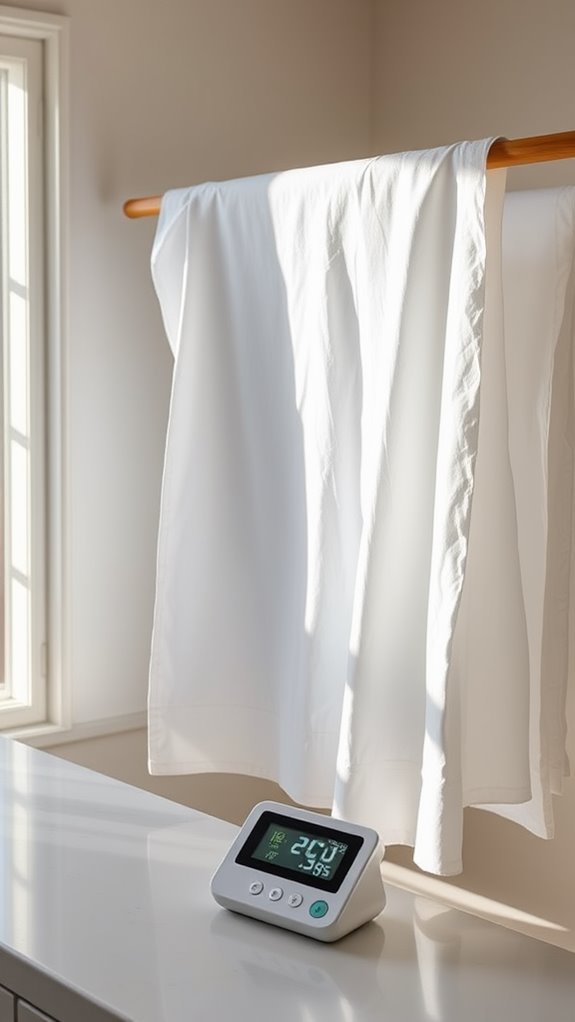
When it comes to drying sheets, I can’t help but feel that timing is everything—because nobody wants to wrestle with a wrinkled mess come bedtime! Here’s how I tackle it:
| Fabric Type | Drying Method |
|---|---|
| Cotton | Tumble low |
| Polyester | Tumble low |
| Silk | Air-dry |
| Linen | Air-dry |
Pull ’em out fast to skip wrinkles, and you’ll be all set!
Avoid These Washing Mistakes
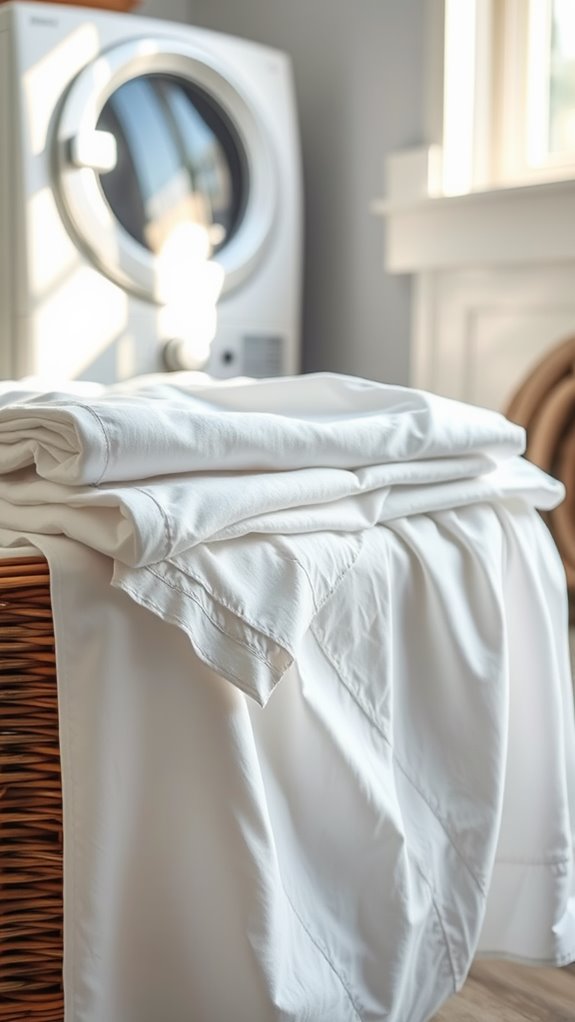
Let’s be real: washing sheets might seem like a no-brainer, but it’s easy to trip up and make some rookie mistakes that could leave your bedding less than pristine.
Too much heat? Hello, shrunken sheets! Cold water? You might as well be washing them in a kiddie pool.
And overloading the machine? That’s just asking for a half-hearted clean.
Keep it smart, keep it fresh!
Frequently Asked Questions
Do You Wash Sheets on Hot or Cold?
When I wash my sheets, I typically use hot water. It really helps kill germs and dust mites. However, I always check the care label to ensure I’m not damaging the fabric.
At What Temperature Should I Wash Bed Sheets?
When I wash my bed sheets, I always check the fabric type first. For cotton, I use hot water, but for delicate fabrics like silk, I stick to cold. It keeps everything fresh and lasting longer!
What Setting Do You Wash Bed Sheets On?
I usually wash my bed sheets on a normal cycle. I find that it effectively cleans them, but I always check the care label first to ensure I’m using the right settings for the fabric.
What Temperature Should Laundry Sheets Be?
I usually wash my laundry sheets in warm water. It helps eliminate germs effectively. Just make sure to check the care labels, as different fabrics have specific temperature needs to maintain quality and cleanliness.
In Conclusion
Hot water (130-140°F) works best for cotton and linen sheets, killing bacteria and dust mites. Delicate fabrics like silk and satin need cold water (80-90°F) to maintain their quality. Always check the care label before washing.
The right temperature choice extends your sheets’ lifespan and keeps them clean. Follow the recommended settings for your specific fabric type, and wash your bedding every 1-2 weeks. Ready to start? Pick the correct temperature and give your sheets the care they deserve.
